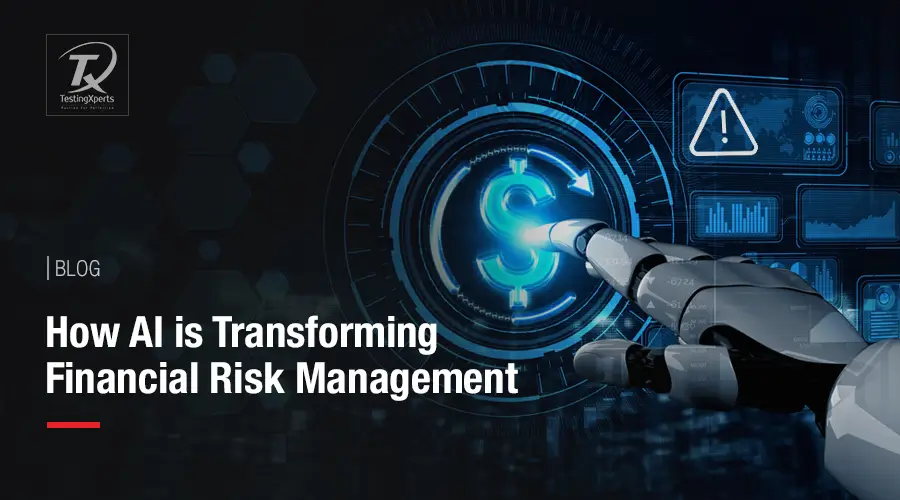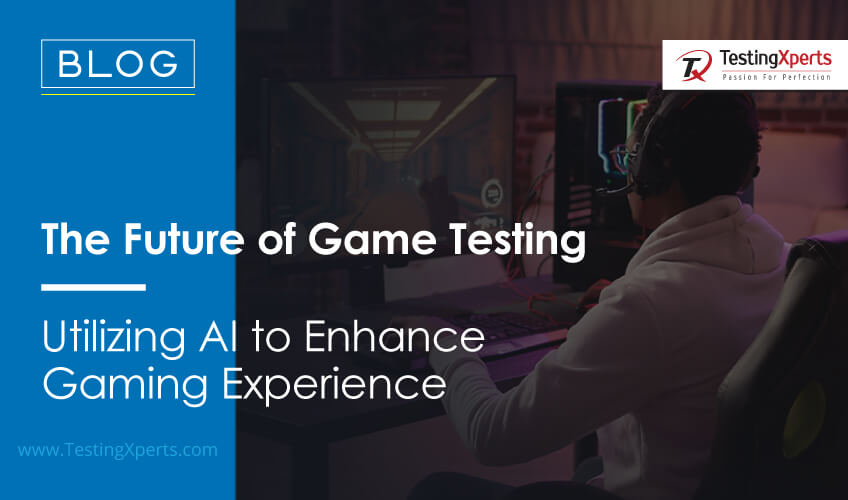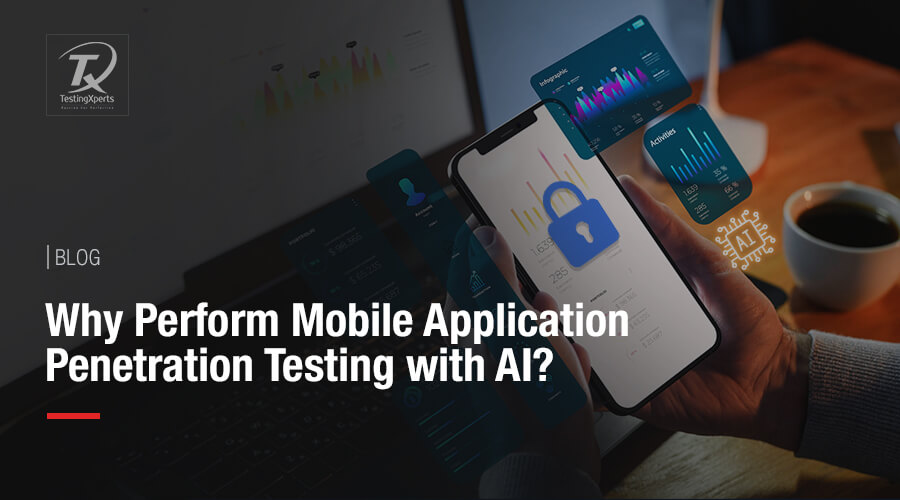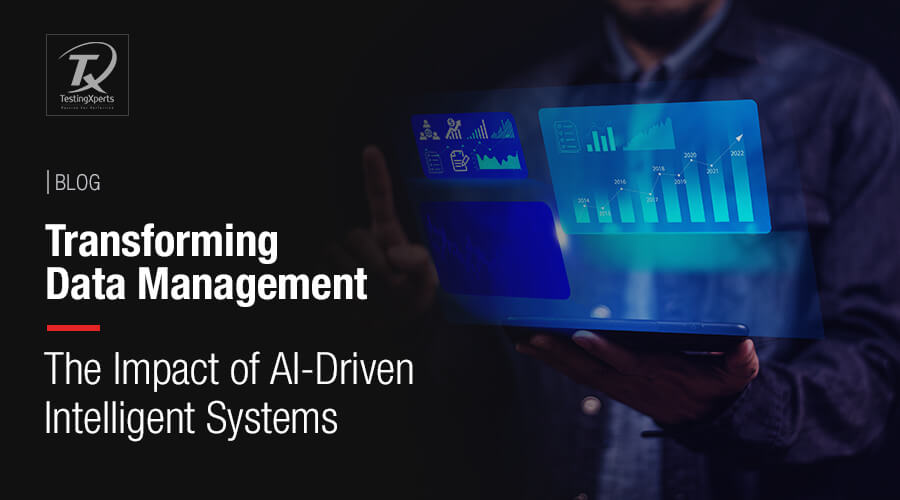
- Understanding the Data Management Puzzle
- Intelligent Systems Hold the Key: Examining Their Depths
- Real World Applications
- Future of AI in Data Management
- Why Partner with Tx to Transform Your Data Management Plan?
- Summary
Data is a priceless asset for businesses in today’s digital, tech-driven world. It is the core of business operations, market insights, and decision-making processes. Maintaining data veracity, value, and volume is crucial in the current customer-centric, rapidly transforming global economy. This makes data management an indispensable approach to drive business success. Modern digital technologies like AI, data analytics, and insights driving smart decision-making depend on well-organized and quality data. Companies like KPMG are already using advanced data management strategies to assist their clients in unlocking internal data value while enabling stakeholders to discover new insights from external data sources.
Now the question is, what’s the role of AI-driven intelligent systems in all this? To answer this question, let’s understand the data management puzzle first.
Understanding the Data Management Puzzle

Data management is like a big puzzle, each representing a unique aspect of efficiently processing vast amounts of information. The sheer volume of data makes it difficult to extract insights and identify trends, which results in missed business opportunities and lost revenue. Also, traditional data management systems are not feasible enough to handle the complexities of modern data sources, such as smartphones, digital documents, social media, IoT devices and sensors, and APIs. The sheer amount of unstructured data these sources generate is out of the league of traditional data management systems like IBM Db2, MySQL, Oracle Database, etc.
Businesses require a more concise approach and advanced AI techniques to capture, analyze, and process the data pieces effectively.
Intelligent Systems Hold the Key: Examining Their Depths

AI-driven intelligent systems can assist businesses in addressing obstacles related to data management. They can identify, analyze, and work on patterns and trends in large datasets, automate data processing, and optimize the speed and accuracy of data analysis by integrating complex algorithms that automate and refine data processes. Let’s take a look at a few of the AI-driven intelligent systems for data management.
Google Cloud AI
Offers a suite of ML services and tools for data processing and analysis.
IBM Watson
Capable of cognitive computing, it processes data as humans do.
AWS ML
Offers services and tools for deploying ML models and automating data processes.
Microsoft Azure AI
Integrates AI tools with cloud computing to deliver services like predictive analytics and anomaly detection.
Salesforce Einstein
An AI layer integrated with the Salesforce platform using ML techniques to enhance the CRM process.
These were just a few examples of intelligent systems businesses use for advanced data management. Intelligent systems assist in streamlining data extraction, where AI solutions like ML and NLP allow businesses to recognize and sort information from unstructured or varied data sources. Teams can improve data mapping and facilitate seamless integration of disparate data sets across platforms without working too much. These systems are best at maintaining data quality as they utilize algorithms to detect inaccuracies and inconsistencies across data and automatically correct them to deliver quality data for decision-making. There are four characteristics of an intelligent system:
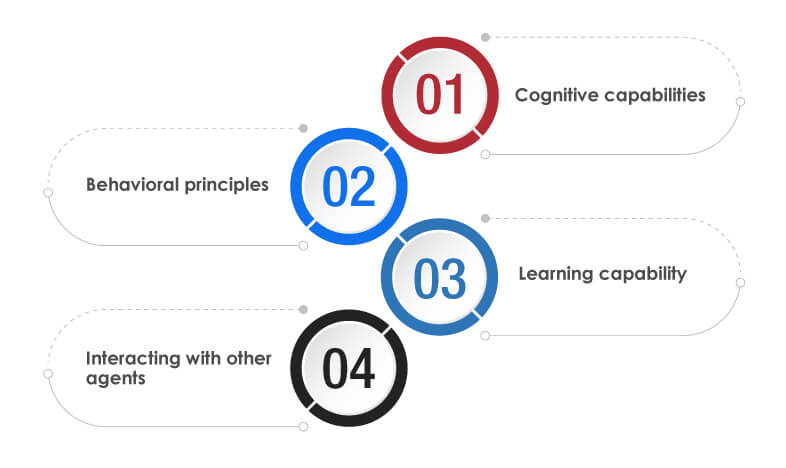
Cognitive capabilities
These systems have embedded cognitive abilities (perception, action control, reasoning, and language use) that enable them to assess, analyze, plan, and act within their environment.
Behavioral principles
They follow behavioral principles based on social norms and rationality to make decisions according to logical reasoning and fulfill social rules and expectations.
Learning capability
These systems are smart enough to learn and adapt to evolving environments. They can optimize behavior and improve performance by utilizing ML and other techniques.
Interacting with other agents
These systems interact with agents like humans or intelligent systems in a designated environment, resulting in adaptive and more sophisticated systems to handle complex real-world environments.
Real World Applications
AI-driven intelligent systems are transforming how businesses manage their data and improve decision-making. These systems use and analyze datasets from multiple sources, discover trends, and predict outcomes quickly. Let’s take a look at a few of the real-world applications:
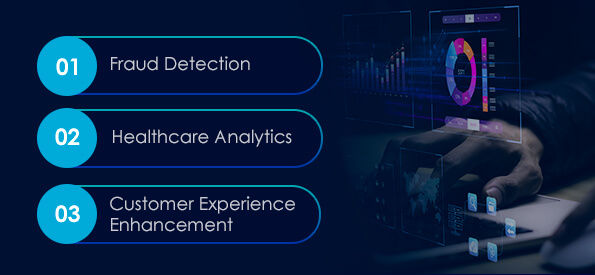
Fraud Detection
Using AI and predictive analytics, banking, and eCommerce businesses can spot and stop fraudulent activities by analyzing historical data to detect odd patterns. The process comprises the following activities:
• Spotting unusual transactions that don’t align with the usual pattern.
• Assigning scores to each transaction allows businesses to identify how likely it is to be fraudulent.
• Evolves as the attackers find new ways to hack the system.
• Capable of discerning fake transactions from real ones, thus reducing errors.
• Sending automatic warning when it detects transactions that seem odd or risky.
Healthcare Analytics
By combining intelligent systems like AI and predictive analytics, healthcare professionals can leverage them to predict patient diagnoses and personalize treatment plans. They can analyze patient records and other info to.
• Detect which patient shows symptoms of getting soon or will need extra care.
• Assist healthcare professionals in diagnosing diseases quicker and more accurately by analyzing patient healthcare data.
• Using historical data to predict when diseases might spread and manage health campaigns to stop them.
Customer Experience Enhancement
AI-driven systems can analyze customer data from various touchpoints to provide personalized experiences. For example:
• Retail businesses can offer personalized product recommendations based on browsing history and purchase behavior.
• Telecommunications companies can use AI to predict customer churn and implement retention strategies.
• These applications show how AI-driven technologies can drive growth and operational efficiency across various industries.
Future of AI in Data Management

The future of data management is closely interlinked with AI tech innovations. AI-powered predictive analytics would allow businesses to foresee trends and make proactive decisions. Intelligent systems will enable real-time data processing and decision-making, thus significantly reducing human error and improving business agility. For instance, AI can utilize past data to predict upcoming sales trends, analyze customer buying patterns, and create new marketing strategies. It would allow data managers to predict future developments and facilitate proactive decision-making, which includes realigning marketing strategies, mitigating security risks, or upscaling resource allocation.
In data security, AI would help businesses identify potential data breaches and prepare a proper mitigation strategy before they occur. It would monitor data access and usage patterns to identify unusual user behavior, indicating the chances of a breach, and alert concerned authorities. In addition, AI would make it easy to integrate diverse data sources (structured, unstructured, and real-time data) under a single entity. It will enable data management teams to identify connections between varying data sources and transform and integrate them into a proper sequence. This can offer a detailed view of business operations, facilitate cross-functional analysis, and enhance decision-making.
Furthermore, AI can enhance data democratization within organizations by enabling non-technical users to access and analyze data through natural language processing and conversational interfaces. This would empower more employees to derive insights and make data-driven decisions without needing deep technical expertise.
Why Partner with Tx to Transform Your Data Management Plan?

Effective data management is necessary to maintain a competitive edge in the rapidly evolving digital business ecosystem. Partnering with a QA company like Tx would offer businesses like yours a strategic advantage in enhancing the integrity and efficiency of data systems by conducting rigorous testing and implementing quality control measures. Collaborating with Tx will ensure your data management strategies are robust, reliable, and ready to tackle digital business challenges.
• We conduct regular audits and checks to minimize inconsistencies and errors in your data sources, which are critical for informed decision-making and operational efficiency.
• Extensive testing of complex data warehouse and BI implementation.
• We use QuerySurge to automate the data analysis and provide a holistic view of your data’s health.
• Our experts conduct thorough validation of data quality with security and performance testing.
• We utilize best-in-the-industry automation tools and in-house accelerators to automate your QA and data validation process.
• We align your data management practices with the latest compliance and security guidelines to reduce the risk of legal issues and data breaches.
• Our experts conduct stress testing of data management systems to ensure they handle increased loads, which is necessary for businesses aiming for growth.
• We provide customized solutions aligning with your business needs and objectives, ensuring maximum ROI from your data management investments.
Summary
Data management is important for businesses to remain competitive in today’s tech-driven world. AI-driven intelligent systems would allow them to enhance data management by automating processes, optimizing data accuracy, and ensuring regulatory compliance. Modern technologies like ML and NLP would streamline the extraction and analysis of large datasets, enabling businesses to make accurate and informed decisions. Intelligent systems have cognitive capabilities that enhance efficiency in real-world applications like fraud detection and healthcare analytics. Integrating AI with data management will offer predictive insights and real-time decision-making capabilities to minimize human error and enhance business agility. Partnering with Tx would ensure your data management strategies are robust, efficient, and ready to support business growth and innovation.
Contact our experts to find out more!
Discover more
Get in Touch
Stay Updated
Subscribe for more info


